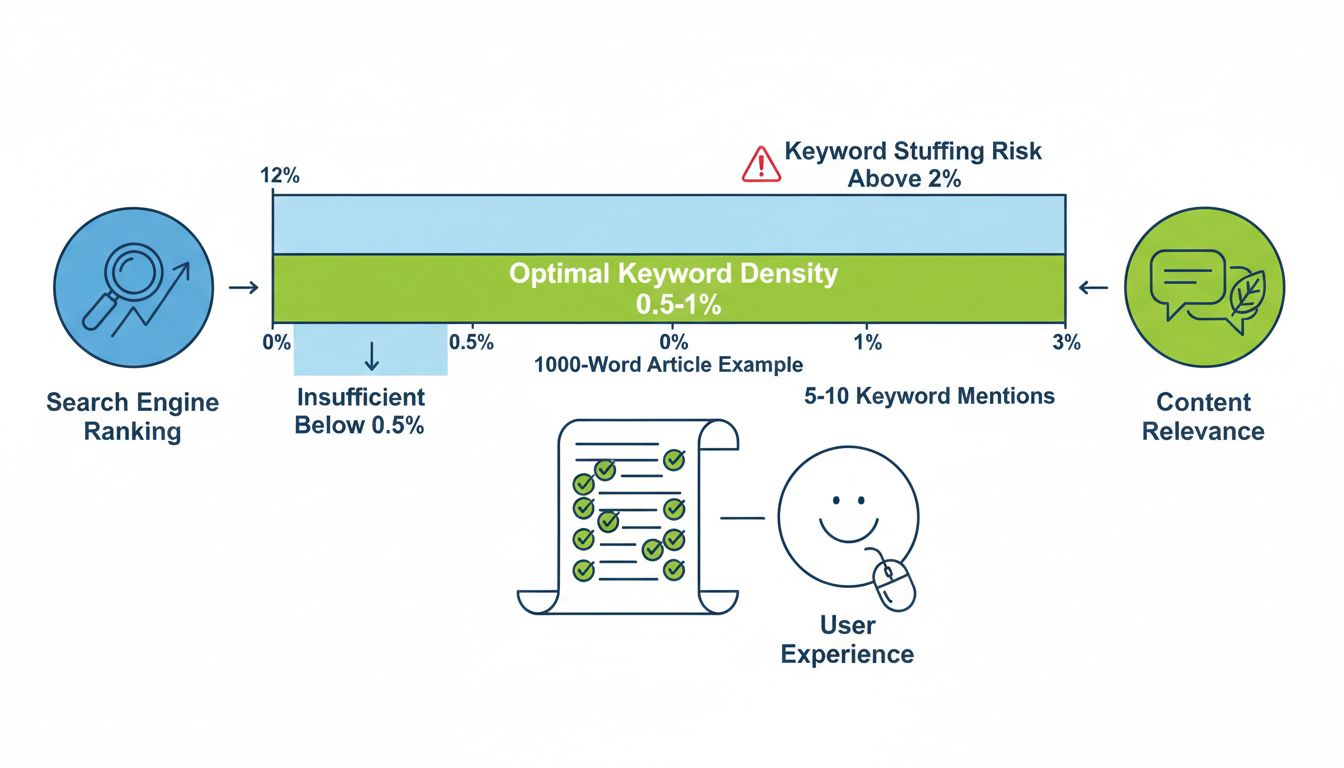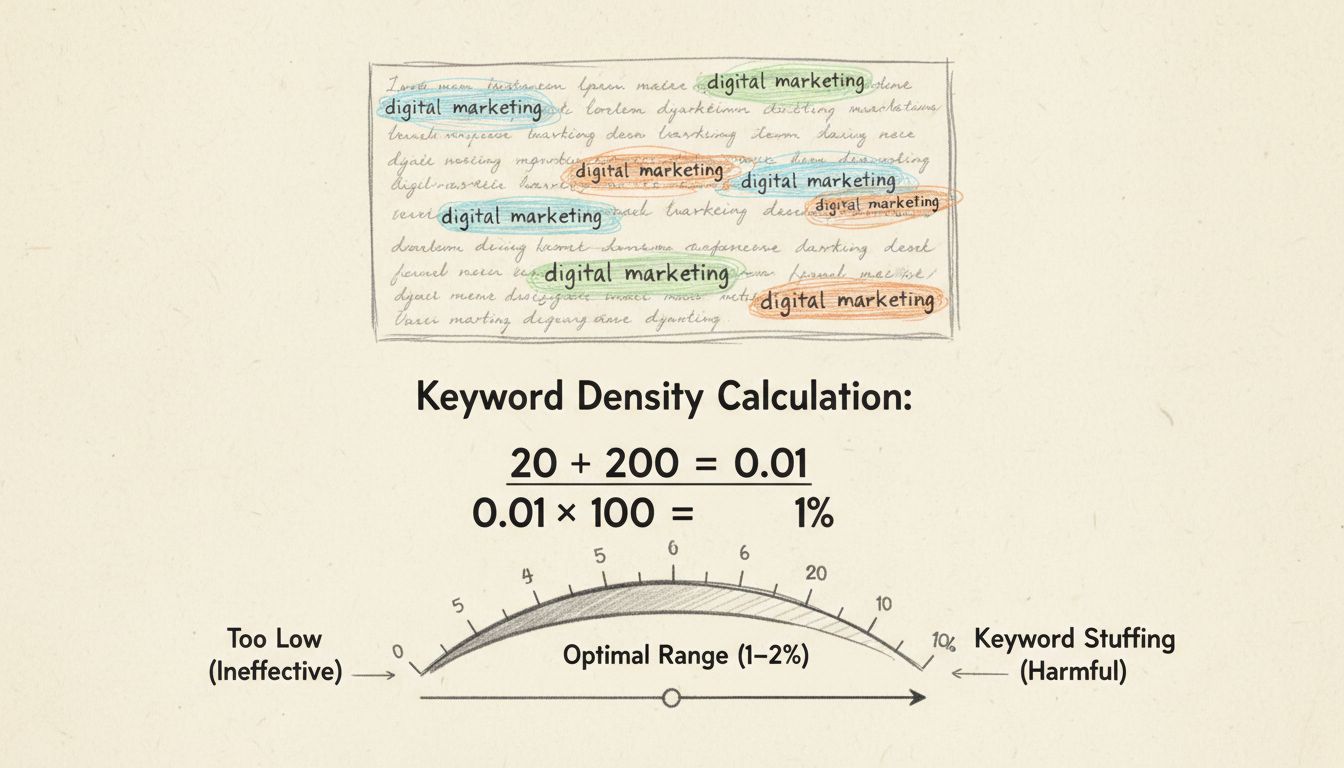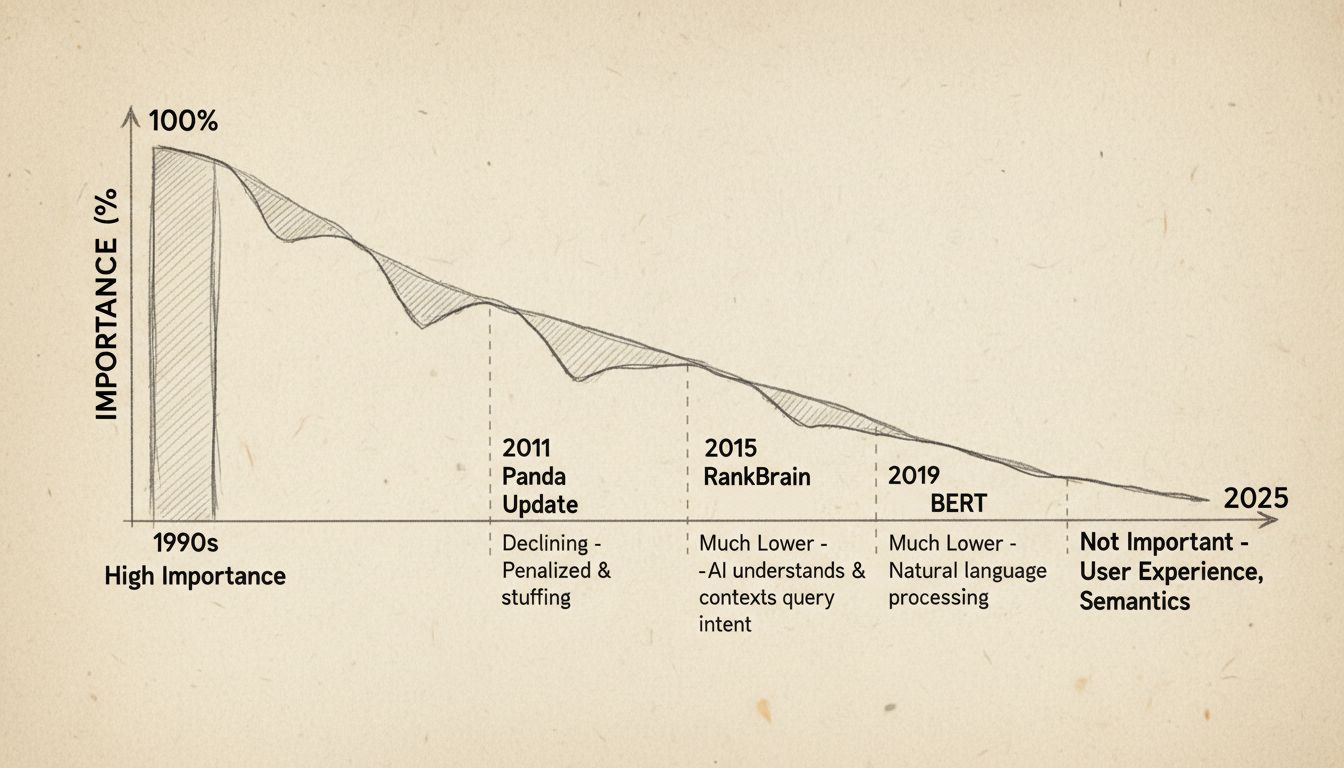
How Can Keyword Density Affect My Affiliate Site's SEO? 2025 Guide
Learn how keyword density impacts affiliate site SEO in 2025. Discover optimal keyword density ranges, best practices, and how to avoid penalties while maintain...
Keyword density is the percentage of times a keyword appears within a text or webpage. Learn the best practices for SEO, avoid keyword stuffing, and optimize your affiliate marketing content.
Keyword density is the measure of how often a keyword appears within a text or webpage. It is calculated using the formula:
[ Keyword Density (%) = Number of Times Keyword is Used/{Total Number of Words * times 100 ]
For instance, if a keyword appears 10 times in a 1000-word article, the keyword density would be 1%.
While keyword density was once a significant factor in SEO, its importance has evolved. Search engines like Google have become more sophisticated, focusing on content quality and user experience rather than just keyword frequency. However, keyword density still plays a role in indicating to search engines what the content is about, thus affecting its relevance to search queries.
Keyword density helps signal the relevance of content to search engines. It indicates the primary focus of the webpage, assisting search engines in categorizing and ranking the content appropriately.
Effective keyword density aligns with user intent by ensuring that the content matches what users are searching for, thereby improving the likelihood of appearing in relevant search results.
Appropriate keyword density can enhance search engine rankings by making content more discoverable. However, it should be balanced with content quality to avoid penalties for keyword stuffing.
There is no universally accepted “ideal” keyword density. Most SEO experts suggest a keyword density of 1-2% as a general guideline. This means that for every 100 words, the keyword should appear once or twice. However, the optimal density can vary depending on the content, target audience, and competitive landscape.
Maintaining optimal keyword density helps avoid penalties from search engines for over-optimization. Keyword stuffing, or excessive use of keywords, is considered a black-hat SEO tactic and can lead to ranking penalties.
There are several tools available to help check keyword density, such as the SEO Review Tools Keyword Density Checker. These tools can provide insights into whether your content is optimized or if it risks keyword stuffing, which can negatively impact SEO.
For affiliate marketers , keyword density is crucial because it helps ensure that content is discoverable by search engines. This visibility can lead to higher traffic, more clicks on affiliate links , and ultimately, increased revenue. However, balance is key, as overly dense keyword use (known as keyword stuffing) can lead to penalties from search engines.
Keyword stuffing refers to the practice of overloading a webpage with a high frequency of keywords in an attempt to manipulate search engine rankings. This tactic was once common but is now considered a black-hat SEO technique that can result in penalties.
Search engines penalize websites that engage in keyword stuffing by lowering their rankings or removing them from search results altogether. This makes it crucial for affiliate marketers to avoid excessive keyword usage.
TF-IDF is a statistical measure used to evaluate the importance of a word in a document relative to a collection of documents. It helps understand how relevant a keyword is in the context of the entire content ecosystem. While not directly used by search engines, TF-IDF can offer insights into keyword relevance and content optimization.
Using keyword variants and clustering semantically related terms can enhance content relevance and visibility. This strategy involves grouping related keywords to provide context and improve search engine understanding of the content’s subject matter.
Prominence involves placing keywords in prominent positions, such as titles, headings, and the beginning of paragraphs, to signal importance to search engines.
Proximity refers to how close keywords are to each other within the text. Closer proximity can suggest stronger relevance to search engines.

While it’s not the sole factor in determining search engine rankings, understanding and applying the right keyword density can significantly enhance your website’s SEO performance. This guide will delve into the concept of keyword density, its importance, and how it can be strategically used in affiliate marketing to drive traffic and conversions.
Keyword density refers to the percentage of times a keyword appears on a webpage relative to the total number of words. It’s a metric used by search engines to gauge the relevancy of a webpage to a specific search term. For affiliate marketers, maintaining an optimal keyword density is crucial to ensure that your content ranks well without falling into the trap of keyword stuffing—a practice that can lead to penalties from search engines.
The formula to calculate keyword density is straightforward: divide the number of times a keyword is used by the total number of words in the article, then multiply by 100 to get a percentage. For instance, if a keyword appears 22 times in a 1500-word post, the keyword density would be 1.47%, which is generally considered acceptable.
While it’s tempting to flood your content with keywords, doing so can harm your SEO efforts. Research indicates that high-ranking pages often maintain a keyword density between 0.5% and 1.5%. Therefore, it’s wise to keep your density below 3% to avoid overstuffing. Instead of repeating the same keyword, use related phrases and synonyms to enrich your content naturally and maintain engagement.
For affiliate marketers, leveraging keyword density effectively can be the key to attracting the right audience. Here’s how you can integrate keyword density into your affiliate marketing strategy :
Mastering keyword density is a critical skill for affiliate marketers aiming to boost their site’s SEO performance. By maintaining an optimal density, using keywords strategically, and diversifying your vocabulary, you can create content that not only ranks well but also engages and converts your audience. Start optimizing your affiliate marketing content today and watch your traffic soar.
Ready to enhance your affiliate marketing strategy? Explore PostAffiliatePro for cutting-edge affiliate software solutions that can take your business to new heights!
It depends on a number of factors, including the specific industry and the overall competitiveness of the keyword. As a general rule, a keyword density of around 2-5% is considered optimal.
Keyword density is not very important for SEO because modern search engine algorithms no longer rely on it in order to understand what a site is about.
There is no ideal keyword density because modern search engine algorithms no longer rely on them for SERP scores.
The ideal keyword density typically ranges from 0.5% to 1.5%. Staying within this range helps avoid keyword stuffing while ensuring your content is optimized for search engines.
Overusing keywords, known as keyword stuffing, can lead to penalties from search engines. It’s essential to maintain a natural flow and integrate keywords seamlessly.
Proper keyword density ensures that your content is relevant and readable, both of which are crucial for good SEO practices. This helps in improving your site’s ranking on search engines.
Master keyword density to improve your website's relevance and search engine rankings. Explore top strategies and avoid penalties for keyword stuffing.

Learn how keyword density impacts affiliate site SEO in 2025. Discover optimal keyword density ranges, best practices, and how to avoid penalties while maintain...

Discover the truth about keyword density in modern SEO. Learn why there's no ideal percentage, how search engines evolved, and best practices for content optimi...

Discover why keyword density is no longer a primary SEO ranking factor. Learn modern SEO strategies that focus on user intent, content quality, and semantic rel...
Cookie Consent
We use cookies to enhance your browsing experience and analyze our traffic. See our privacy policy.